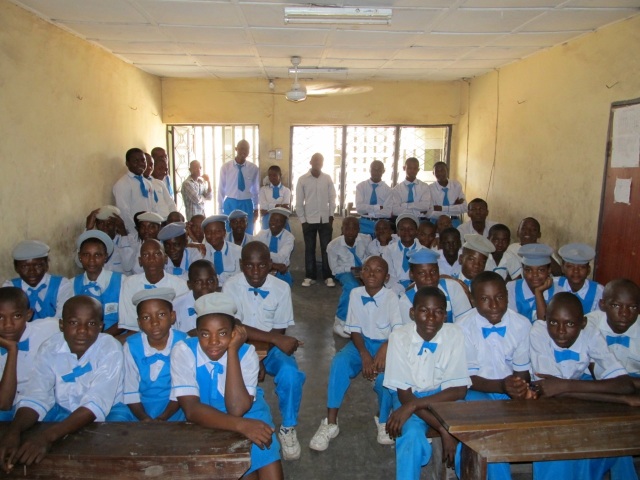The threat which many young women face as they seek education in northern Nigeria has been forcefully brought home in recent weeks by the abduction of several hundred young students.
Not long ago, I visited an Anglican diocese not far from where the students were recently abducted. On that visit, I learned from Bishop Marcus Ibrahim and others in the Diocese of Yola about the church’s outsize role in education and the vital importance of English-language education for all students, regardless of gender.
I wrote about the church’s role in education in my new book, Backpacking through the Anglican Communion. Here’s an excerpt.
A major focus of the diocese’s work was education. The weakness of the government in Nigeria means it has essentially abdicated any role in schools. When he became bishop, Marcus started the Anglican Junior Seminary Yola, a secondary school. When I visited, there were about sixty students at AJSY, and they met in an old house that had been donated by a family in the diocese. The language of instruction is English, unlike many of the Islamic-run schools in the area, and the school admits boys and girls equally, making AJSY one of the few institutions in the state that educates girls in English. I was asked to speak to an assembly, and was impressed by how articulate and interesting the students were. They had very good and challenging questions for me and were promising young Nigerians. It was clear, however, that the house was too small. The assembly met while crammed into what I imagined was the main living space, with students standing against walls or sitting on the ground with their knees scrunched up against their chests to make space for the people around them.
Marcus took me out to see the spacious piece of land the diocese purchased on the edge of Yola to build a new school. Progress was coming, but it was slow. In the two years prior to my visit, the diocese raised the funds necessary for three classroom blocks, which have enough space for double the number of students currently enrolled. But delays in building the dormitory meant the school was not yet able to open. The builders had completed the dorm’s foundation, but then the money ran out. Marcus and I walked across the foundation, and he pointed to where the individual rooms and communal spaces would be. He was bubbling over with excitement about the possibilities of the school, sketching in the dirt possibilities for expansion once this initial site was up and running.
All the money for the construction had come from Nigerians, some from donors who lived outside the diocese, but much from members of the diocese. At a diocesan council meeting I attended, the conversation centered on raising funds for the four hundred bags of cement necessary to finish the dorm. Each bag cost about fifteen dollars. Council members brainstormed ways to raise the money: Ask each deanery to contribute a set amount? Approach the richer members of congregations? Eventually, they settled on assigning each congregation a specific number of bags of cement to provide based on the congregation’s size and average offering in the past year….
“Have you looked for any international support?” I asked Marcus when we were at the school site. Off the top of my head, I could think of several organizations that were interested in funding projects exactly like this one.
“We have,” Marcus said, in a tone that combined disappointment, frustration, and regret. “But no one will help us. They think because of the problems in the Anglican Communion that they can’t work with us in Nigeria.”…
“Look,” Marcus said. “I want to build this school. Children need to be educated. Girls need to be educated. That’s not happening in Yola. Anglicans can work together on this.” We let the words hang in the air. We both knew that. But how could other people come to know?…
The sun was setting. We stood on the foundation and looked back at the future AJSY together. The empty classroom blocks and the dormitory foundation, as well as the students crammed into classrooms in an old house, represented the real-life lost opportunities that result from the narrative of disunity in the Anglican Communion, a narrative that has been propagated by some of its most senior members. Marcus and I were testament to the utter wrongness of that narrative. But our story would never seize headlines or lead to special meetings of Anglican leaders. As we headed back to the car, my steps were heavy with deep, profound sorrow.
As we pray for the return of these kidnapped students, we also pray for the grace to act to ensure an educated future for all in the region who want to learn.
When I initially visited the school, I wrote about it in two different posts. You can also read more about how the Nigerian government has abdicated its role in education in this post, about a visit to a different school in southeastern Nigeria.


This is good stuff, Jesse. Thanks.